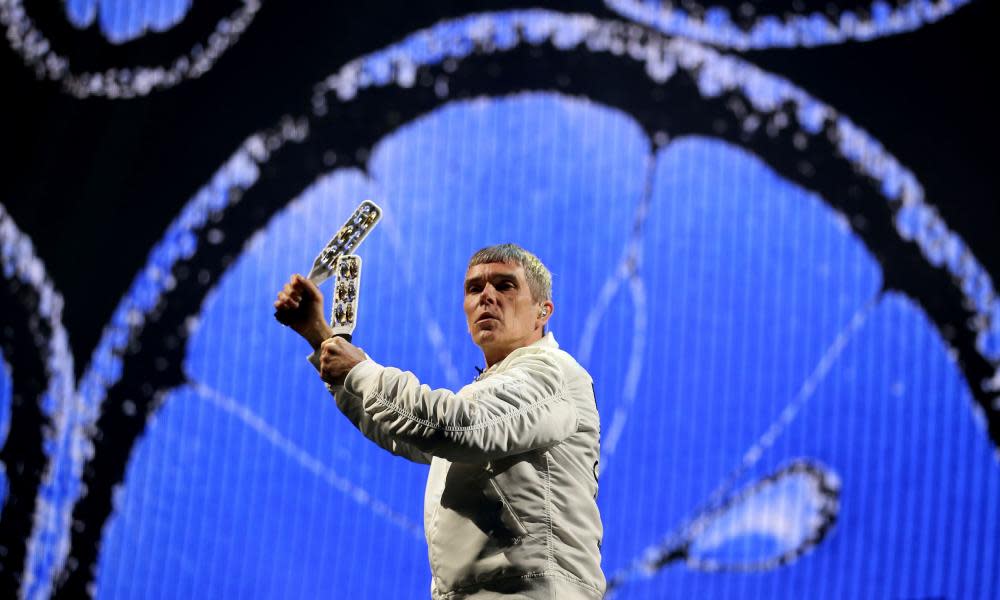Medical experts v anti-vaxxers: the Covid-19 information battle

On one side is the “anti-vax” movement, a constellation of groupings drawn from across the ideological spectrum, far-right opportunists and celebrities including the former Stone Roses frontman Ian Brown.
On the other is the NHS, virtually the entire medical community, government departments and Brown’s former Stone Roses bandmate John Squire.
Related: Engagement with anti-vaccine Facebook posts trebles in one month
Brown, who is one of the latest British celebrities to act as a conduit for the spread of misinformation about coronavirus, appears to be revelling in his newfound role after tweeting: “NO LOCKDOWN NO TESTS NO TRACKS NO MASKS NO VAX.” In an apparent response, Squire tweeted less than an hour later: “Wear a mask. Stay safe. Look after yourself and others.”
The Northern Irish musician Van Morrison has also joined the ranks of the Covid sceptics, describing the British government as “fascist bullies disturbing our peace” in one of three new tracks he has written to protest against safety measures to prevent the spread of the virus. He criticised “celebrities telling us what we’re supposed to feel”, but denied he was one of them.
“No more lockdown / No more government overreach / No more fascist bullies / Disturbing our peace,” he sings on No More Lockdown. “No more taking of our freedom / And our God-given rights / Pretending it’s for our safety / When it’s really to enslave.”
default
And as the struggle to convince people of the safety of potential forthcoming Covid-19 vaccines escalates, members of the public told the Guardian of feelings ranging from concern to outright hostility.
“I understood it takes two to three years for a safe vaccine to be developed, so I can’t imagine how they can get a safe one ready early,” said a 42-year-old teacher, who said they would be more likely to trust an “early vaccine” if the government had more competent leadership.
Another person, who also requested to remain anonymous, echoed that view: “I’m not an anti-vaxxer. It’s that I’m an anti-rushed-out-essentially-untested-and-minimally-effective-vaxxer. I prefer proper safety testing protocols and side-effect testing … not this made-for-public-relations farce. I have faith in vaccines, just not one that is beta-tested on me by this bunch.”
Among those with a more extreme view was a 60-year-old man from Liverpool, who claimed that there was “a conflict of interest” between Bill Gates, the World Health Organization, big pharma and politicians.
He said he got his information from a UK-based membership-funded website, which has the stated aim of uncovering corruption but which the Guardian found had been hosting content echoing anti-vaccine sentiment and conspiracy theories.
The proliferation of misinformation online comes at a potentially difficult time in the search for a safe vaccine. Western experts have been expressing concern about the opaque nature of the speedy development of a Russian vaccine already licensed for use, while a trial by AstraZeneca and Oxford was last week given the green light to resume after being paused due to a reported side-effect in a participant.
Bobby Duffy, a professor of public policy at King’s College London – who in research with Ipsos Mori in July found that only 53% in the UK would be certain or very likely to take a Covid-19 vaccine – said there was a clear link to belief in conspiracy theories and mistrust of government, authority and science among certain groups who were more hostile than others to a vaccine.
“There is a relationship between trust in government, trust in government information and scepticism and concern about vaccination and what we have seen over time during the crisis,” he said.
While that made it more difficult to convince some groups to take a vaccine, he said, a counterpoint was that people were clearly eager for a solution to the current crisis and there were high levels of confidence that a vaccine would be developed.

 Yahoo News
Yahoo News 
